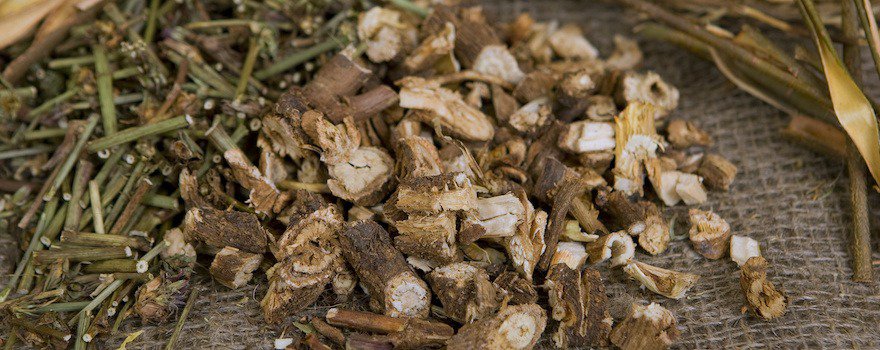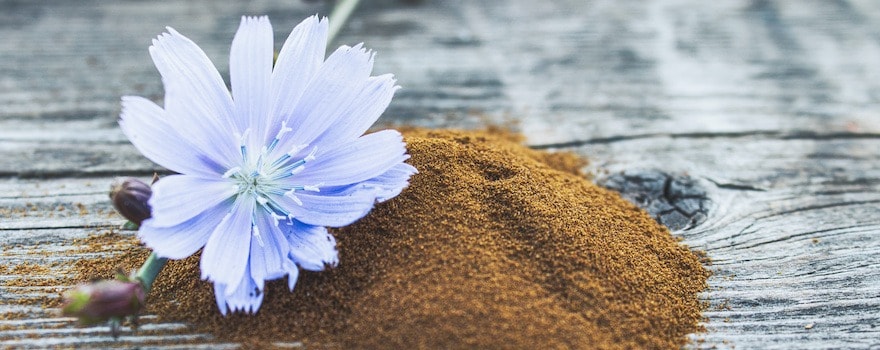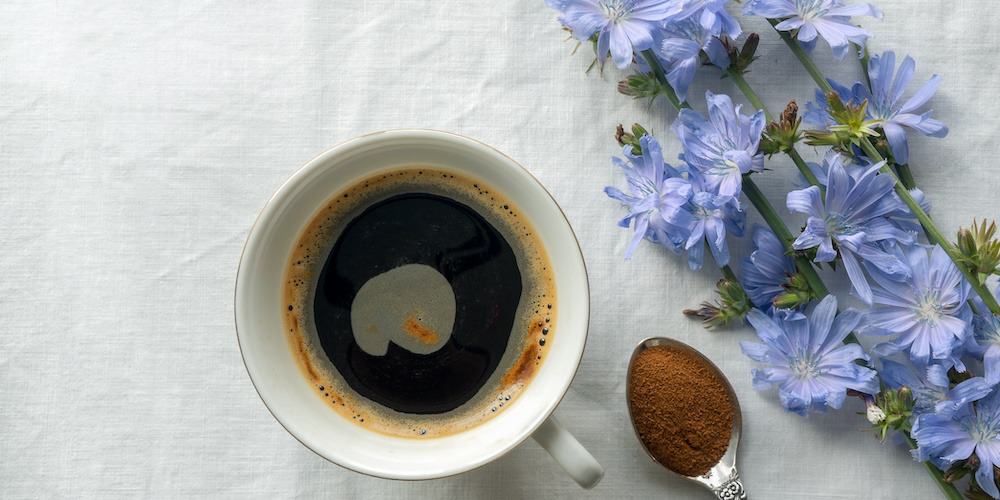BENEFITS OF CHICORY
✓ Improves gastrointestinal comfort
✓ Anti-inflammatory
✓ Antioxidant
✓ Improves diabetes
✓ Protects the heart
What is chicory?
Chicory is a plant from the Asteraceae family, just like stevia or yarrow. The Cichorium genus includes many wild or cultivated varieties, consumed either for their leaves or their roots.
The Cichorium intybus or “wild chicory” is the most well-known of all. Its roots are harvested, roasted, and then ground into a powder to make the famous hot beverage.
It grows naturally in Europe, India, and North Africa. Often considered a weed, it quickly spreads in meadows, wastelands, and roadsides. The plant has a taproot, yellow-brown in color, and can reach up to 75 cm in length.
While chicory leaves are also edible, its roots are primarily used in herbal medicine. In traditional medicine, they are used to relieve various ailments: wound treatment, diabetes, inflammation…
From the 1980s onwards, research has multiplied. They have highlighted its exceptional composition and numerous benefits for the body. Thus, it improves gastrointestinal comfort and has antioxidant and anti-inflammatory effects. It also alleviates diabetes and protects the heart.
Today, it is mainly cultivated for its roots, used in the production of a coffee substitute. However, the inulin it contains is also used as a sweetening agent and as a texturing agent in the food industry. Thanks to its sweet flavor, it could replace sweeteners and reduce sugar content in industrial foods.
Nutritional Composition
- Amino acids
- Vitamins: pro-vitamin A, B1, B2, B3, B9, E, K
- Minerals and trace elements: potassium, magnesium, sodium, iron, phosphorus, calcium
- Proteins
- Fibers: inulin
- Sugars
- Carbohydrates
- Natural acids: chicoric, chlorogenic, linoleic, alpha-linolenic, stearic, myristic, palmitic
- Antioxidant actives: flavonoids, coumarins, polyphenols
- Tannins
- Bitter substances: intybin, taraxarcin, lactucopicrin, lactucin

The benefits of chicory
♻️ Improves gastrointestinal comfort
With about 3 g per 100 g, chicory is an interesting source of fiber. It notably contains soluble fibers, including inulin. Also present in artichokes and dandelions, this particular fiber improves gastrointestinal comfort.
Inulin has a prebiotic effect meaning it feeds the good bacteria in the microbiota, allowing them to fully perform their role and develop in good conditions. Thus, it is among the best prebiotic foods, alongside carob or chia seeds. It is recommended in cases of sluggish transit, difficult digestion, bloating, and constipation.
This study from Hokkaido Information University (Japan), conducted on humans, shows how chicory improves intestinal transit.
🔥 Anti-inflammatory
Thanks to its anti-inflammatory effects, chicory is useful for relieving muscle and joint pain related to osteoarthritis and arthritis. It also helps speed up wound healing and relieve certain skin problems like acne and eczema.
Moreover, it contains intybin, a bitter substance with sedative and analgesic properties. It soothes and reduces the sensation of pain.
This study from the University of Texas Southwestern Medical Center (USA), conducted on patients with osteoarthritis, demonstrates the anti-inflammatory potential of chicory.
🥝 Antioxidant
Chicory root contains many antioxidant actives: flavonoids, coumarins, polyphenols… These compounds effectively fight against free radicals and protect the body from their damage. They trap reactive free radicals, stimulate the immune system, and boost the activity of antioxidant enzymes.
Its antioxidants also have hepatoprotective effects and reduce liver lesions.
This study from the University of Damanhour (Egypt), conducted on rats, shows the antioxidant activity of chicory.
🍭 Improves Diabetes
Regular consumption of chicory helps improve diabetes. In addition to reducing blood glucose levels, it lowers blood pressure, which is often very high in diabetics.
Its soluble fibers, including inulin, limit blood sugar spikes after meals, slow down carbohydrate absorption, and improve insulin resistance.
This study from the University of Medical Sciences of Tabriz (Iran), conducted on diabetic patients, shows the effectiveness of chicory in improving the condition.
❤️ Protects the Heart
Chicory is a great protector of the heart and supports its proper functioning. The caffeic acid it contains inhibits platelet aggregation, responsible for thrombi (blood clots).
Moreover, by reducing systolic and diastolic blood pressure, this plant prevents many cardiovascular diseases. Finally, it decreases blood and plasma viscosity for better circulation in the arteries.
This study from the University of Pécs (Hungary), conducted on humans, shows the cardioprotective effects of chicory.

How to Consume Chicory?
Soluble Chicory
Harvested in autumn, the chicory roots are then washed, cut, and dried. They are cut into “chips” and undergo roasting, which gives them a caramelized flavor. Finally, they are ground into grains and sprayed into a drying tower to obtain a fine powder.
Mixed with water, animal or plant-based milk, the soluble form makes it possible to enjoy a delicious hot drink that advantageously replaces coffee. It is prepared the same way and can be enjoyed at any time of the day, even in the evening.

Dried Chicory Roots
It is also possible to find dried chicory roots. This form is interesting for preparing a decoction to relieve gastrointestinal disorders. To do this, simply boil 50 g of roots in 50 cl of water and let it infuse for about 10 minutes. Strain and then enjoy.
Consume Sustainably: Choose Local, Organic, and Fair-Trade Chicory
✓ Chicory is cultivated in many countries worldwide (South Africa, United States, Australia, India…) and in Europe (Belgium, Netherlands, Germany…). France is simply the leading European producer. With 50,000 tons harvested each year, the Nord-Pas-de-Calais region accounts for 95% of French production!
✓ Therefore, chicory grown in France can be easily found. Favor those grown through organic agriculture and/or fair-trade channels.
Dosage
The recommended dosage is 3 to 5 g of chicory per day.
Contraindications and Side Effects
Chicory consumption has certain contraindications:
- As a precaution, it is not recommended for pregnant and breastfeeding women and young children;
- Its consumption is not advised in case of gallstones;
- Individuals allergic to plants from the Asteraceae family should avoid consuming it;
- Because it is rich in vitamin K, it is not recommended during anticoagulant treatment.
Chicory consumption has certain side effects:
- Stomach pains
- Flatulence
- Diarrhea
- Allergic reaction
If you experience side effects, stop your consumption and consult a doctor.
Report by Julia Perez
Sources and scientific studies
Renée A Street, Jasmeen Sidana, Gerhard Prinsloo, 2013. Cichorium intybus: Traditional Uses, Phytochemistry, Pharmacology, and Toxicology.
Mie Nishimura, Tatsuya Ohkawara, Toshiyuki Kanayama, Kazuya Kitagawa, Hiroyuki Nishimura, Jun Nishihira, 2015. Effects of the extract from roasted chicory (Cichorium intybus L.) root containing inulin-type fructans on blood glucose, lipid metabolism, and fecal properties.
Nancy J Olsen, Valerie K Branch, Geetha Jonnala, Mira Seskar, Melisa Cooper, 2010. Phase 1, placebo-controlled, dose escalation trial of chicory root extract in patients with osteoarthritis of the hip or knee.
Yasser El-Sayed, Mohamed Lebda, Mohammed Hassinin, Saad A Neoman, 2015. Chicory (Cichorium intybus L.) Root Extract Regulates the Oxidative Status and Antioxidant Gene Transcripts in CCl4-Induced Hepatotoxicity.
Mahdieh Abbasalizad Farhangi, Ahmad Zare Javid, Parvin Dehghan, 2015. The effect of enriched chicory inulin on liver enzymes, calcium homeostasis, and hematological parameters in patients with type 2 diabetes mellitus: A randomized placebo-controlled trial.
Edit Schumacher, Eva Vigh, Valéria Molnár, Peter Kenyeres, 2011. Thrombosis Preventive Potential of Chicory Coffee Consumption: A Clinical Study.



